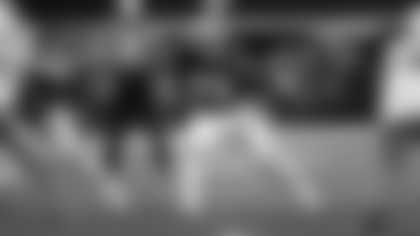FRISCO, Texas – Strange this life's twists and turns.
Here they were, once combatants on the football field who later in life became best of friends, brought together by, of all things, The Catch.
Dwight Clark, the San Francisco 49ers receiver, and at the time, Jan. 10, 1982, Everson Walls, the Dallas Cowboys rookie cornerback. There they were afterward, on that iconic cover of Sports Illustrated, Clark leaping high in the air, catching the bottom half of the football in the end zone with Walls flashing by underneath, scoring the winning touchdown in the 49ers' 28-27 victory over the Cowboys with 51 seconds remaining in the NFC title game.
That was not just any win. San Francisco moved on to capture the franchise's very first Super Bowl two weeks later, and became the NFL's team of the 1980s. The Cowboys, with already five Super Bowl appearances, having won two Lombardi Trophies during that span from 1970-78, would suddenly fade from the NFL landscape, needing another 11 seasons to show up in the Super Bowl again.
One play, changing the course of history. And the lives of two players.
All of this came flooding back this week when Clark, at the far too young age of 61, passed away, that insidious disease of Amyotrophic Lateral Sclerosis (ALS) eating away at his previous vibrant life over the past three years.
How fortunate we were this past season, on Oct. 22, that the Cowboys played at San Francisco on the day the 49ers, sensing the end was near, paid tribute to Clark with an emotional halftime ceremony, complete with a video tribute. Many of his teammates were introduced on the field. Clark couldn't make it down there. He had been confined to his wheelchair, introduced from his perch in an end zone suite. Next to him, former team owner Eddie DeBartolo, tears streaming down his face when Clark managed to stand.
"I was behind him," Walls would tell us on this past year's Dallas Cowboys Legends Show.
Behind him?
Says their friendship "goes past professional, goes past that game," thanks to The Catch.
Yes, they had become that close, Clark's former Niners teammate Keena Turner inviting Walls to be there for the tribute that Sunday game against the Cowboys.
"For that to happen, just sad," Walls would tell us of Clark's final years.
But that Walls got to know Clark was a mostly silent tribute to the type of man Clark had been during his nine-year NFL career and afterward. Walls says they first ran into each other in the mid-'80s at an awards banquet.
"He comes up to me and just kind of introduces himself and started talking to me about getting my money from Kodak for The Catch," Walls said. "First time I had officially met him.
"First thing he does when he comes up to me, 'Hey, Everson, did you get your money?'
"I go, 'What are you talking about?'
"He goes, 'Kodak paid me $10,000 for The Catch,' *because they were running that commercial with Barbara Streisand singing about *the way we were (and using the play)."
Heck, Clark told him, they even paid quarterback Joe Montana $5,000, and he wasn't even in the picture.
"I'm getting roasted for this play and they're getting paid for it," Walls said. "He did not have to do that, he did not have to do that."
Walls eventually would make contact with Kodak, and was invited to Super Bowl XXII following the 1987 season, meaning he was there in person to see his former Grambling State quarterback Doug Williams and the Washington Redskins beat Denver for the Lombardi Trophy.
"And I was there for that," Walls said. "So cool, and he did not have to do that."
From then on, the two would hook up at autograph signings, the guy who made The Catchand the poor corner who set an NFL rookie record with 11 interceptions that year – a total that still stands today as the most interceptions in a single season since 1981 – who appeared to be covering him. Sitting side by side, signing away.
So this has been a tough one for Walls to take.
"Heartbreaking, just heartbreaking," Walls would say that evening at the Cowboys Club here at The Star. "Seeing him in that wheelchair was the tough part to see."
There is no known cure for ALS, resulting in paralysis of voluntary muscles and eventual respiration failure, a disease according to a 2017 study in Europe and North America that affects two in 100,000 people, with an average survival time after first being diagnosed of just three years.
"You could see it, it's happening, it's happening," Walls recalled from that Sunday at Levi's Stadium. "And that just pisses you off."
So strange this life of ours.






